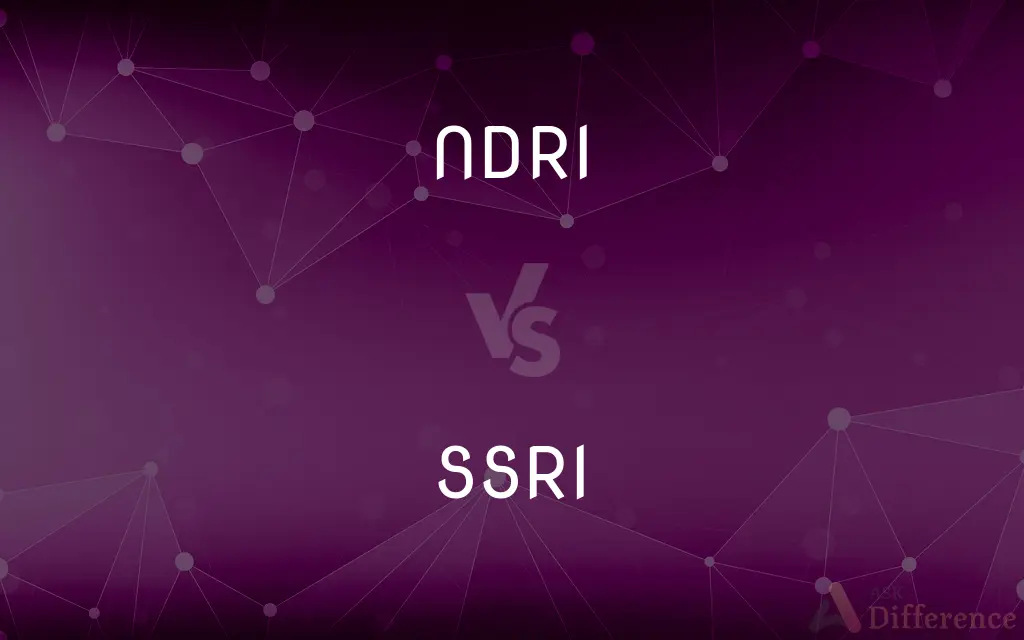NDRI vs. SSRI — What's the Difference?
By Maham Liaqat & Urooj Arif — Published on March 5, 2024
NDRI targets both norepinephrine and dopamine neurotransmitters, enhancing mood and alertness, whereas SSRI focuses on increasing serotonin levels, primarily used to treat depression and anxiety.

Difference Between NDRI and SSRI
Table of Contents
ADVERTISEMENT
Key Differences
NDRI medications, such as bupropion, work by blocking the reuptake of norepinephrine and dopamine, two neurotransmitters associated with alertness, energy, and attention. This mechanism can lead to improved mood and decreased fatigue. In contrast, SSRIs, like fluoxetine, increase serotonin levels in the brain by preventing its reuptake into the presynaptic cell. This action is believed to improve mood, anxiety, and other symptoms of depression.
NDRIs can be particularly effective for patients who experience fatigue or attention deficits alongside depression, they may not be the first choice for those with anxiety, as they can sometimes increase anxiety levels. SSRIs, however, are often preferred for treating anxiety disorders due to their generally calming effect on the brain.
NDRIs and SSRIs differ in their side effect profiles as well. NDRIs may cause insomnia, agitation, or increased heart rate, reflecting their stimulatory effect on norepinephrine and dopamine. SSRIs are more likely to cause sexual dysfunction, weight gain, or gastrointestinal issues, related to their impact on serotonin.
The choice between an NDRI and an SSRI for treating depression or anxiety depends on the individual's specific symptoms, medical history, and response to previous treatments. While NDRIs might be better for someone with lethargy, SSRIs might be more appropriate for someone with pronounced anxiety.
In terms of application, NDRIs have also been used in the treatment of ADHD and certain forms of addiction, leveraging their effects on dopamine and norepinephrine. SSRIs, with their serotonin-enhancing effects, have been used to treat a broader range of conditions, including various anxiety disorders, obsessive-compulsive disorder, and even certain eating disorders.
ADVERTISEMENT
Comparison Chart
Primary Neurotransmitter Target
Norepinephrine and Dopamine
Serotonin
Common Uses
Depression, ADHD, SAD (Seasonal Affective Disorder)
Depression, Anxiety Disorders, OCD, PTSD
Common Side Effects
Insomnia, dry mouth, increased heart rate
Sexual dysfunction, weight gain, nausea
Example Medications
Bupropion (Wellbutrin)
Fluoxetine (Prozac), Sertraline (Zoloft)
Mechanism of Action
Inhibits reuptake of norepinephrine and dopamine
Inhibits reuptake of serotonin
Compare with Definitions
NDRI
It may cause fewer sexual side effects compared to SSRIs.
Patients switching to an NDRI often report a decrease in sexual dysfunction.
SSRI
SSRIs primarily increase serotonin levels to alleviate depression and anxiety.
Fluoxetine is a popular SSRI for treating major depressive disorder.
NDRI
NDRIs are used off-label for weight management.
Due to its effect on appetite suppression, bupropion is sometimes used to aid in weight loss.
SSRI
They are commonly prescribed for a range of anxiety disorders.
Patients with generalized anxiety disorder may find relief with SSRIs.
NDRI
NDRIs can be effective in treating seasonal affective disorder (SAD).
For those with SAD, NDRIs might be recommended to boost energy levels during winter months.
SSRI
Long-term use of SSRIs may result in weight gain.
Ongoing SSRI treatment is sometimes associated with gradual weight increase.
NDRI
They may not be the best choice for patients prone to anxiety.
Some individuals may experience increased anxiety when taking an NDRI.
SSRI
SSRIs can lead to gastrointestinal side effects.
New SSRI users often report nausea or diarrhea in the first few weeks.
NDRI
NDRI increases both norepinephrine and dopamine levels to improve mood and alertness.
Bupropion is often prescribed as an NDRI to help with depression and ADHD.
SSRI
SSRIs are considered first-line treatments for depression.
Doctors frequently start depression treatment with an SSRI due to their efficacy and safety profile.
SSRI
Any of a class of drugs, such as fluoxetine or sertraline, that inhibit the reuptake of serotonin by neurons of the central nervous system and are primarily used in the treatment of depression and obsessive compulsive disorder.
SSRI
An antidepressant drug that acts by blocking the reuptake of serotonin so that more serotonin is available to act on receptors in the brain
Common Curiosities
Can NDRIs cause anxiety?
Yes, NDRIs can sometimes increase anxiety due to their stimulatory effect on norepinephrine and dopamine.
What are NDRIs used for?
NDRIs are used to treat depression, ADHD, and SAD by increasing norepinephrine and dopamine levels.
Are SSRIs or NDRIs better for depression?
The choice depends on individual symptoms and side effect profiles; SSRIs are generally preferred for their efficacy and tolerability.
Can SSRIs treat anxiety?
Yes, SSRIs are widely used to treat various anxiety disorders due to their serotonin-enhancing effects.
What are common side effects of NDRIs?
Common side effects include insomnia, dry mouth, and increased heart rate.
Are NDRIs stimulants?
NDRIs have stimulant-like effects due to their action on norepinephrine and dopamine but are not classified as stimulants.
How do SSRIs work?
SSRIs work by blocking the reuptake of serotonin into the presynaptic neuron, increasing serotonin levels in the brain.
Do NDRIs affect serotonin?
NDRIs primarily affect norepinephrine and dopamine and have minimal direct impact on serotonin levels.
Do NDRIs have fewer sexual side effects than SSRIs?
Yes, NDRIs typically have fewer sexual side effects compared to SSRIs.
Can SSRIs cause weight gain?
Yes, SSRIs can lead to weight gain in some individuals, particularly with long-term use.
Can you switch from an SSRI to an NDRI?
Yes, under medical supervision, patients can switch between SSRIs and NDRIs based on treatment response and side effects.
Is bupropion an NDRI or SSRI?
Bupropion is an NDRI, targeting norepinephrine and dopamine reuptake.
How long do SSRIs take to work?
SSRIs may take several weeks to show full effects on depression and anxiety symptoms.
Are SSRIs addictive?
SSRIs are not considered addictive, but sudden discontinuation can lead to withdrawal symptoms.
Can NDRIs help with weight loss?
NDRIs, such as bupropion, have been used off-label to aid in weight management due to their appetite-suppressing effects.
Share Your Discovery

Previous Comparison
Technical Writing vs. Creative Writing
Next Comparison
Restraining Order vs. Order Of ProtectionAuthor Spotlight
Written by
Maham LiaqatCo-written by
Urooj ArifUrooj is a skilled content writer at Ask Difference, known for her exceptional ability to simplify complex topics into engaging and informative content. With a passion for research and a flair for clear, concise writing, she consistently delivers articles that resonate with our diverse audience.















































